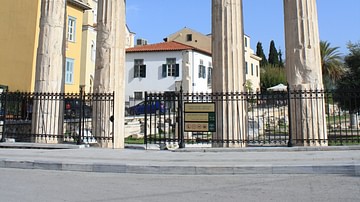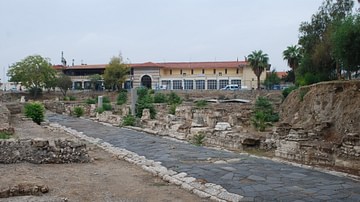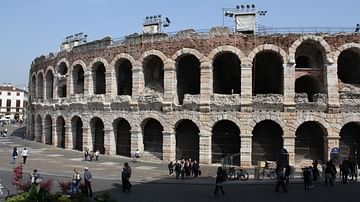Search
Search Results

Article
Roman Expeditions in Sub-Saharan Africa
Sub-Saharan Africa was explored by Roman expeditions between 19 BCE - 90 CE, most likely in an effort to locate the sources of valuable trade goods and establish routes to bring them to the seaports on the coast of North Africa, thereby minimizing...

Article
Hellenistic & Roman Agora of Athens
Pericles’ agora of Athens flourished under Macedonian control. After Macedon was defeated by Rome, the Romans added to the district even before Greece was taken as a province and more so afterwards. The Roman version of the agora continued...

Article
Roman Women in Business
Roman women faced legal, ideological, and cultural limitations in several areas of their lives; deep-rooted traditions regarding the role of women in the Roman world resulted in pre-conceived views which saw women characterised by weakness...

Definition
Roman Senate
The Roman Senate functioned as an advisory body to Rome's magistrates and was composed of the city's most experienced public servants and society's elite. Its decisions carried great weight, even if these were not always converted into laws...

Definition
Tarsus
Tarsus was a city in ancient Cilicia located in the modern-day province of Mersin, Turkey. It is one of the oldest continually inhabited urban centers in the world, dating back to the Neolithic Period. It was built close by the Cydnus River...

Collection
Ancient Roman Warfare
With a huge reserve of resources in men and equipment and a culture geared for warfare, the Romans were relentless in expanding their borders and putting their neighbours to the sword. The Roman army, with its well-trained, well-equipped...

Article
Family Planning in Greco-Roman Antiquity
Family planning was a topic of vital importance in the ancient Mediterranean. Some of the earliest medical literature from ancient Greece and Rome deals with fertility and reproductive health. Among the numerous treatments and procedures...

Lesson Pack
Roman Innovations and Architecture
We have prepared two lesson plans including classroom activities, assignments, homework, and keys as well as: - Glossary of keywords and concepts in an excel format - Open questions adaptable for debates, presentations, and essays -...

Definition
Titus (Roman Emperor)
Titus was Roman emperor from 79 to 81 CE. On June 24, 79 CE Titus Flavius Vespasianus succeeded his father Vespasian (r. 69-79 CE) as emperor of the Roman Empire. Prior to his ascension to the throne, he was considered by many as “…unpopular...

Definition
Roman Verona
Verona, situated on the river Adige in northern Italy, was a Roman town probably founded some time in the 2nd century BCE. It was a colonia by 69 CE and the impressive monuments which survive to this day attest to the city's importance. In...